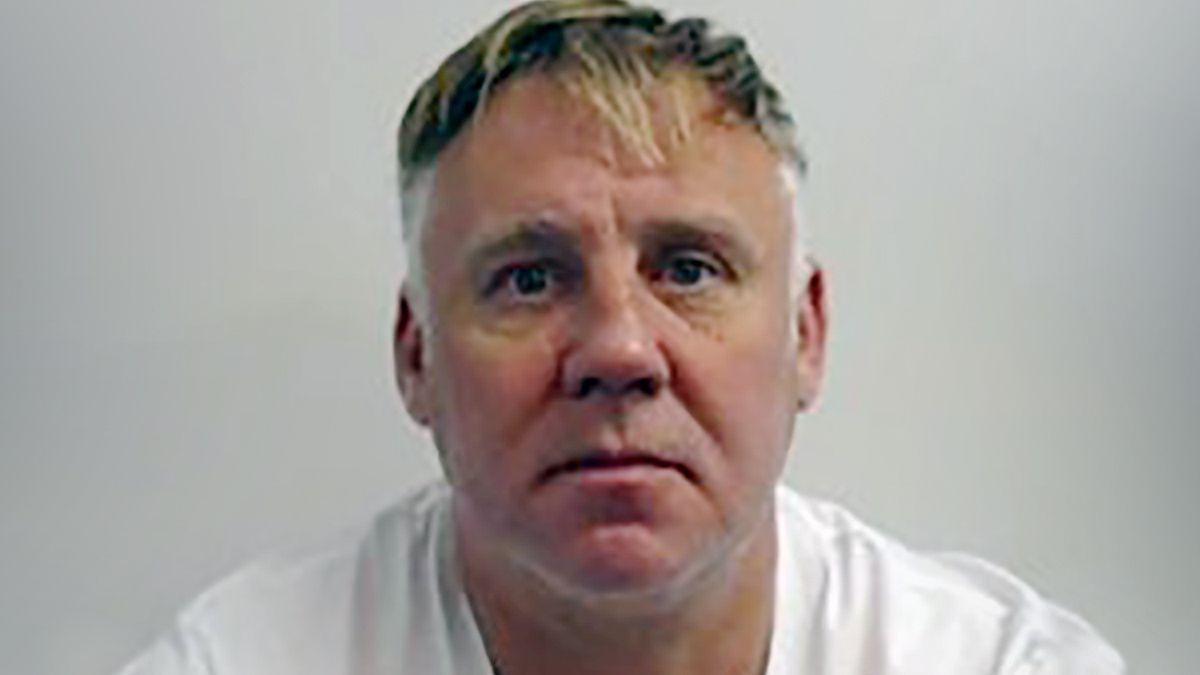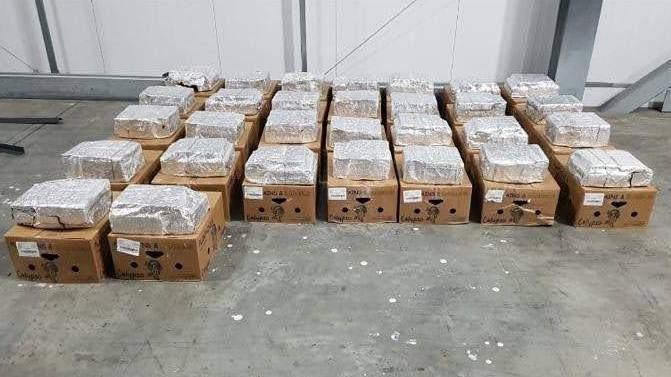Scotland's 'Tony Soprano' smuggled cocaine in banana boxes

Jamie Stevenson admitted directing the drugs smuggling operation
- Published
A notorious gangland criminal has admitted masterminding a plot to smuggle nearly a tonne of cocaine from South America to Scotland hidden in a cargo of bananas.
Known as 'Iceman', Jamie Stevenson has pled guilty to directing the importation of the drug which was seized by Border Force teams at Dover in September 2020.
The seizure, named Operation Pepperoni, involved the National Crime Agency and Police Scotland. At the time the NCA estimated the cocaine’s value at £100m.
The 119 packages of cocaine were concealed in boxes of bananas from Ecuador, addressed to a fruit merchants in Glasgow.
The operation spanned the UK, Spain, Ecuador and Abu Dhabi.
Stevenson, from Rutherglen in South Lanarkshire, was a leading figure operating at the top level of organised crime in Scotland.
He was once described as Scotland’s answer to Tony Soprano, the mafia boss portrayed in television series The Sopranos.

The trial heard how drugs were discovered in a banana box shipment at Dover
The 59-year-old was charged with murdering his best man and criminal associate Tony McGovern outside a Glasgow pub in 2001 - but the case was dropped due to a lack of evidence.
Six years later, after being targeted by a groundbreaking undercover police inquiry, Stevenson admitted laundering more than £1m of dirty money.
He was jailed for 12 years but was back on the streets by 2014.
The prison term did not curtail Stevenson’s criminal career.
By summer 2020, he was once again a wanted man after police seized 28 million Etizolam “street Valium” tablets at a pill factory in Kent.
Etizolam has been implicated in hundreds of drug deaths in Scotland.
Stevenson was arrested but released on bail, allowing him to flee the country. The cocaine seizure at Dover followed that September.
In 2022, the National Crime Agency named Stevenson in a list of the UK’s 12 wanted men and within weeks he was back in custody.
A joint operation by the NCA, Police Scotland and Dutch National Police led to his arrest while out jogging in Bergen op Zoom after a period of surveillance.
Stevenson was extradited back to the UK and went on trial this month at the high court in Glasgow along with six other men.
Encrypted messages
Evidence began on Monday with Stevenson denying a total of 14 charges, but the 59-year-old has now admitted his role in smuggling cocaine and producing and supplying Etizolam.
Jurors heard it took officers three days to recover cocaine hidden in banana boxes that were sent from Ecuador.
Police said properties in Scotland and England were searched after the drugs were seized and officers identified the men involved.
Fruit merchant David Bilsland, 68, and Paul Bowes, 53, have pled guilty to serious organised crime and drug offences.
Gerard Carbin, 45, Ryan McPhee, 34, and Lloyd Cross, 32, pled guilty earlier in the trial.
And Lewis Connor, 27, was jailed for three years in July after the investigation found encrypted phone messages which proved he had set fire to properties and vehicles across Central Scotland.
The investigation was closely linked to Operation Venetic which has seen hundreds of arrests following the infiltration of an encrypted communications platform used by criminals.
Three-day search found tonne of cocaine in banana boxes, court told
- Published26 August 2024
Drugs trial hears £1m of cash found in house
- Published27 August 2024
NCA regional head of investigations Gerry Mclean said: “Following his arrest in 2020, career criminal Stevenson fled the country but continued to direct the importation of cocaine into the UK from abroad, falsely believing he could evade justice.
“His plea today, and the earlier admissions of guilt by five of his co-conspirators, are testament to the dedicated work of NCA officers, our Police Scotland partners and our many law enforcement colleagues right across the globe.
“Together we are working tirelessly to disrupt and dismantle organised crime groups who supply class A drugs, ensuring that all those involved, wherever they choose to hide, are brought before the courts.”
Stevenson’s jailing in 2007 followed Operation Folklore, an investigation by the Scottish Crime and Drug Enforcement Agency which used electronic surveillance, undercover officers and forensic accounting to probe his criminal activities.
The agency’s director general at the time, Graeme Pearson, welcomed Stevenson’s new conviction at the high court.
“Jamie Stevenson has for many decades now been a very senior figure in organised crime, and would be counted in that very small group of people at the top of the pyramid,” he said.
“He ran his business in much in the same way as the Sopranos ran their business as shown on television.”